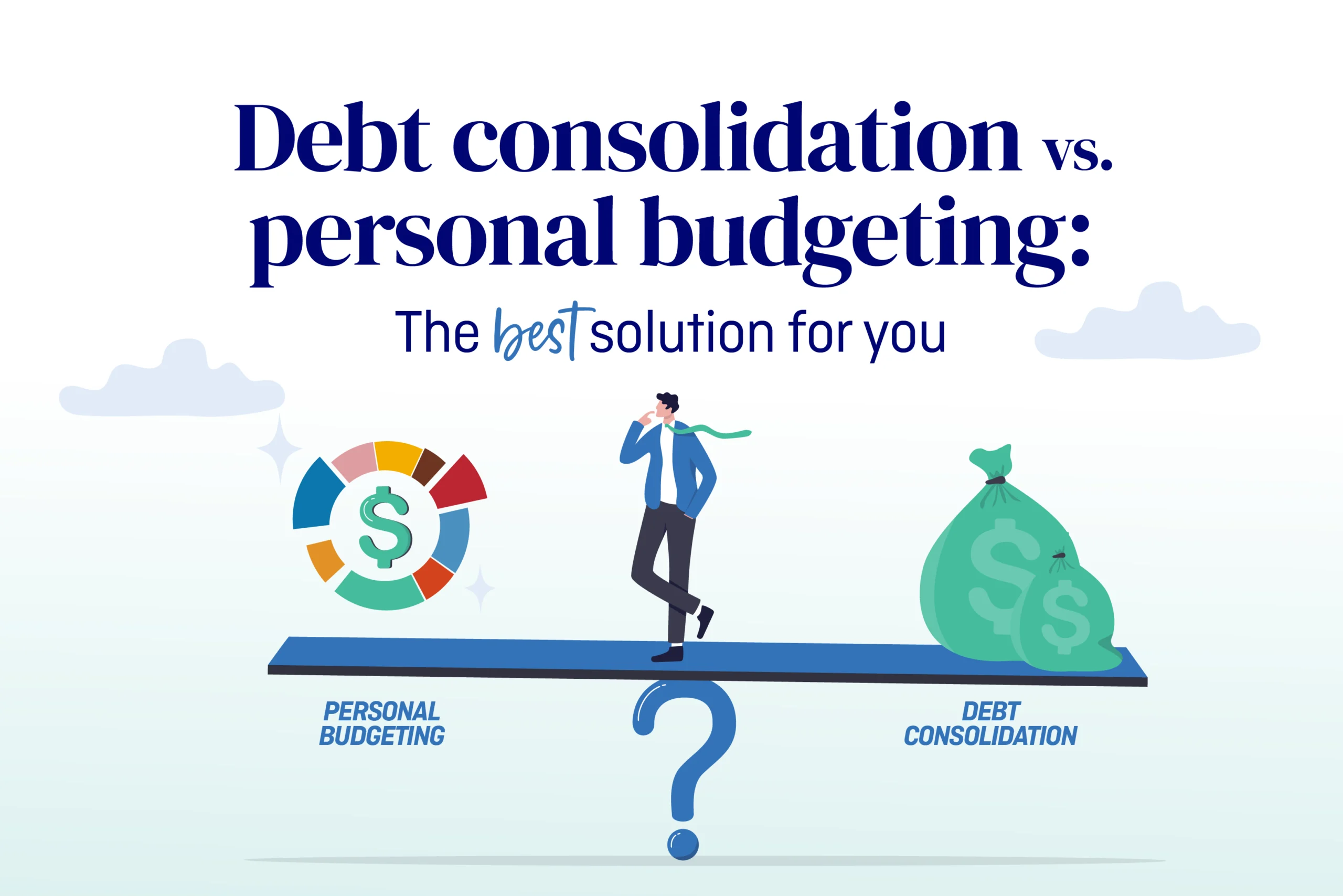How to get ahead financially: help to get out of debt and save money
Discover practical ways to pay off debt, save more, and finally get ahead financially, with real-life inspiration from MyBudget clients Kylie and Scott.

Why is it so hard to get ahead financially?
If it feels like your money disappears faster than you can earn it, you are in the right place.
According to Employment Hero, 73% of Australians live pay to pay and nearly one in two struggle to cover regular household costs like rent and groceries before payday.
These numbers paint a clear picture: many people are doing their best to keep up, yet still find it hard to get ahead financially.
But here’s the good news: getting ahead financially isn’t necessarily about earning more money. It’s about making the most of the money you already have with money management tips from the experts. And with the right tools and support, you can go from surviving to thriving, just like MyBudget clients Kylie and Scott.
Before we get to their story, let’s start with some practical steps you can take to turn your finances around.
How can I get out of debt and save money?
The first step to getting ahead financially is knowing where your money’s going. Start by creating a realistic budget plan that includes your income, fixed expenses (like rent, loans, and utilities), and variable costs (like food, entertainment, and subscriptions).
Our free Personal Budget Template makes it easy to map it all out.
Once you have visibility of your full financial position, you can start tackling debt strategically. Types of debt like high-interest credit cards are usually the biggest drain on your finances, so focus on clearing those credit card balances first.
Which debt repayment strategy should I choose?
A popular debt repayment method is the debt snowball method (paying off the smallest debt first for motivation), others are the avalanche method (targeting the highest interest rates first). Either way, consistency is key.

If you’re still making only minimum payments on your credit cards, read our guide on the true cost of making only minimum payments. You’ll see just how much interest adds up over time, and how much faster you could be debt-free by increasing repayments, even slightly.
If you need help to get out of debt right now, download our free ebook: 6 steps to eliminate credit card debt.
Should I consolidate my debt?
Debt consolidation can simplify your finances and potentially lower your monthly repayments, but it’s not a one-size-fits-all debt solution. If spending habits don’t change, debt can easily creep back up.
Over 70% of Australians rely on short‑term credit to get by, most often through credit cards or Buy Now Pay Later services. It shows just how many people are borrowing to bridge the gap between paydays.
Employment Hero, Financial Behaviour Snapshot, January 2025
Before consolidating debt, ask yourself:
- Will I save on interest overall?
- Can I stick to a realistic repayment plan?
- Will this address the cause, or just the symptom?
Debt consolidation can help, but budgeting is what really helps get you ahead financially. Read more in our comprehensive guide: Debt consolidation: is it right for you?
What debt relief solutions are available?
If you’ve tried negotiating with creditors and still can’t keep up with your bills, MyBudget can help you explore a range of debt relief solutions tailored to your situation.
MyBudget’s debt relief options:
- Budgeting support: tailored budget plans that align with your lifestyle and income to help you stay on track toward your long-term financial goals
- Creditor negotiation: we liaise directly with creditors and debt collection companies to negotiate reduced repayments, waived interest, or more flexible payment terms
- Debt management plans: we create strategies to reduce high-interest credit card debt and restore your credit score over time
- Debt consolidation loans: through MyBudget Loans, we can help combine multiple personal debts into one manageable repayment plan
- Mortgage refinancing: expert guidance to reduce mortgage stress, avoid arrears, and find breathing room in your repayments. (Try our free Mortgage Stress Calculator)
- Personal loans: help restructuring your repayments so they fit your lifestyle and budget
- Debt arrangements, Debt Agreements and Bankruptcy: when all other options are exhausted, MyBudget can offer tailored debt solutions based on your unique financial situation and guide you through the process with care and expertise.
If you need general advice, you can contact the National Debt Helpline. But if you want ongoing money coaching and dedicated support, MyBudget can help you create a clear path from financial chaos to financial control, and stay with you every step of the way.
How budgeting helped Kylie & Scott get ahead financially
Through heartbreak, hospital stays and financial collapse, Kylie and Scott found the one thing that got them through it all – MyBudget.
With mounting bills, no income, and a newborn daughter fighting for her life, they emailed MyBudget saying: “Don’t contact us. Our baby might not make it. We have no money.”
Instead of walking away, the MyBudget money experts stepped in. They contacted creditors, landlords, and sorted out everything so the couple could focus on their family.
Watch their story on YouTube or or listen on the MyMoney MyStory podcast.
“I thought, ‘we’re doing okay, we don’t need help.’ But deep down, I knew I needed to change the way I thought about money”.
Kylie, MyBudget client
Still with MyBudget, eighteen years later, they’ve built savings, bought their first home, and are thinking about planning for retirement, all through consistent budgeting.
Their story proves that financial transformation isn’t about income; it’s about having a system that works.
How can I stay on track financially and build wealth long-term?
Getting ahead financially doesn’t stop when the debt’s gone, that’s when the real progress begins.
According to Finder’s Wealth Building Report, 38% of Australian investors say budgeting carefully and reducing expenses contributed most to their net wealth.
It’s proof that consistent financial discipline, not luck, is what builds wealth over time.
Here are practical ways to start building long term wealth:
- Automate payments and savings to stay consistent
- Build an emergency fund to cover at least three months of expenses
- Regularly review your budget plan to adjust for changes in income or expenses
- Set specific, meaningful financial goals, like saving for a home deposit, retirement, or a family holiday
- Keep learning about personal finance and celebrate milestones along the way.
For more insights into common budgeting mistakes and how to fix them, read our blog: Why am I always broke?
Get ahead with your finances today – take the next step
Whether you’re overwhelmed by debt, living pay to pay, or just tired of the financial juggle, you don’t have to face it alone.
With MyBudget, you can live your life free from money worries.
For over 25 years, MyBudget has helped more than 130,000 Australians pay off debt, start saving money, and build long-term financial security.
We’ll help you:
✅ Create a personalised budget that fits your lifestyle
✅ Deal with your bills and creditors for you
✅ Pay off debt faster
✅ Build savings for the future
Call our Money Experts now on 1300 300 922 or book a free, no obligation chat to explore your options, and see how we can help you get ahead financially.
FAQs
What does MyBudget do?
MyBudget helps Australians manage their money, pay off debt, and save for the future by creating personalised budgets, paying bills on time, and offering expert financial coaching and creditor negotiation support.
How much does MyBudget cost?
The cost of MyBudget varies depending on your individual financial situation and level of service. Your first appointment is free, so you can see how MyBudget works and what plan suits your goals before making any commitment.
What are the best ways to get ahead financially in Australia?
Start by creating a budget plan, reducing personal debt, building an emergency savings fund, and setting realistic financial goals. Tools like MyBudget’s free Personal Budget Template can help you get started.
How can I get out of debt faster?
Focus on high-interest debts first, like credit cards or payday loans. Strategies such as the snowball or avalanche method, debt consolidation, or a tailored Debt Management Plan can make a big difference.
What’s the most effective way to build long-term financial security?
Budget consistently, automate your savings, and review your plan regularly. Prioritise debt repayments, build an emergency savings fund, and work towards bigger goals like paying off your home loan or growing your retirement savings.
Can MyBudget help if I’m in serious financial hardship?
Yes. If you’re overwhelmed by debt or facing ongoing financial stress, MyBudget can explore debt relief options, negotiate with creditors, or create a manageable repayment plan so you can regain control of your finances.
Up next: Your money mindset is your greatest asset for financial success.
Check out MyBudget’s free money management tools.
Start with a FREE no obligation appointment



